If you have ever tried navigating the world of Customer Relationship Management systems, or CRMs, then it might have occasionally felt like sailing through some particularly stormy seas. One moment you are doing fine and the next you are thrown completely off course by the always-changing tides of tech and user demands. Luckily it doesn’t have to stay that way! Today we are highlighting five common CRM mistakes and how you can transform them from pitfalls to valuable insights.
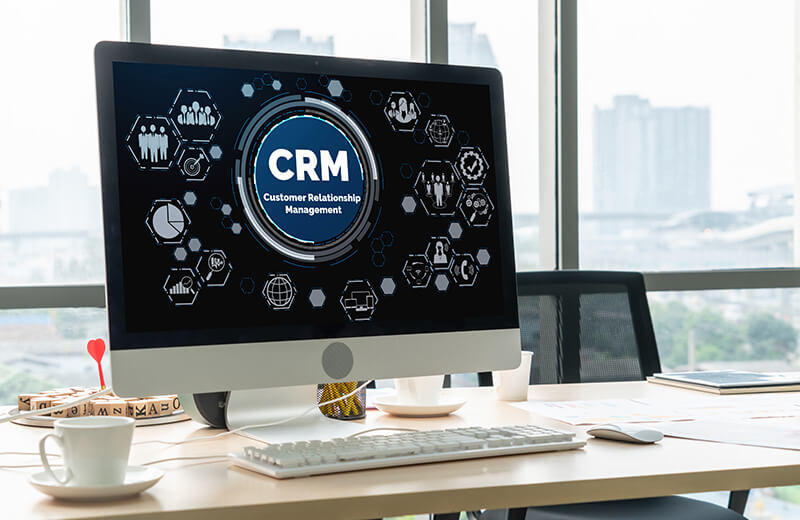
Now, it is tempting to think that your shiny new CRM system is a plug-and-play; you just put in your info and start using it right away. Unfortunately, one of the most common mistakes we see people make is skipping training for your team early on. Any CRM is only as effective as the people using it and if your staff does not know how to navigate its features, especially the ones critical to your business, that system essentially becomes a costly digital paperweight.
Luckily for you the fix for this particular mistake is fairly easy. Invest in a comprehensive training program for all employees who will interact with the CRM software so that everyone knows what they are supposed to be doing. Most CRMs have training sessions specifically to train teams just like yours or you might engage a CRM consulting firm such as ours to get everyone up to speed. And, remember, continuous learning should be trusted and drilled into the company culture, encouraging users to enhance their skills and productivity.

Next up, customizing a CRM can make it feel tailor-made for your business, keeping the most useful aspects and dropping ones you don’t need, but beware the trap of over-tweaking! Too much customization can lead to maintenance nightmares and confusion among users, especially those who have been trained to expect things a certain way.
To solve this problem it is best to adopt a 'less is more' philosophy when it comes to customizing your CRM. Focus on essential modifications that directly enhance business goals. Make decisions by consulting the team that will use or maintain the system, and ensure customizations support business processes rather than slow them down.

Moving on, a CRM system is only a tool and not a genie to make all your problems disappear with the press of a button. And, most importantly, it cannot do anything on its own. Without clear goals and objectives, i.e a proper plan for what you want your CRM to do and how it will benefit your business, you'll find yourself tangled in a mess of features and data with no defined endpoint in sight.
Instead, start off on the right foot by clearly defining the goals you want to achieve. Are you looking to improve customer engagement, streamline sales processes, or better analyze data? With targeted objectives, you can better assess CRM features and align them with specific business needs. Keep in mind that you will need to regularly revisit and refine these goals as your business evolves.

This is a two-fold problem… A CRM system without data being fed into it continuously is a ship without a compass, but one with too much extraneous info is effectively a digital junk drawer. You want to find the right balance between too little and too much data, and poor data management leads to inaccurate client profiles and misguided decisions.
To fix this, implement data quality measures by regularly auditing and cleansing your database. Also, make sure that there are consistent data entry protocols and implement automated processes where possible to avoid human error. Your best bet here is to assign a CRM leader - a dedicated staff member responsible for database accuracy and integrity.

Finally, any CRM system should empower its users at every level, from the very bottom to the tip-top, and not become some stagnant thing that never updates with the change of time and users. Ignoring the valuable feedback of those who interact with the system daily can cause all sorts of problems, from disengagement to inefficiency and more.
Instead, aim to cultivate a consistent feedback loop with CRM users. This can be done by creating forums or channels specifically for CRM discussions. Also, allow and even encourage staff to propose improvements.Continuous feedback, followed by actionable reforms, can unlock the potential of even the most reticent CRM user.

In the end, identifying these common CRM mistakes and applying out strategic solutions instead will allow business leaders to harness the power of their systems far more efficiently and effectively. Let's turn those potential pitfalls into great opportunities for you and your team so that you can get back to the business of doing business.
At Woggle Consulting, we love Zoho CRM for its flexibility and user-friendly features. For more insights on optimizing your CRM experience, check out our blog on how to migrate to Zoho CRM.
If you're running a business and looking to grow your online presence, you've probably heard the term "digital marketing funnel." It might sound like marketing jargon, but a digital marketing funnel is one of the most powerful tools to attract potential customers, guide them through their buying journey, and convert them into loyal clients.
So, what exactly is a digital marketing funnel, and why do you need one? Let’s break it down.

A digital marketing funnel is the path your potential customers follow from the moment they first discover your brand to when they make a purchase (or even beyond). It’s called a “funnel” because, like a real funnel, it narrows down as people move through the stages. At the top, you’ve got a broad audience that may not know anything about your business, and by the time you get to the bottom, you have a smaller, more focused group ready to take action.
The key stages of a digital marketing funnel are:
Let’s dive into each stage and talk about how to guide potential customers through this journey.
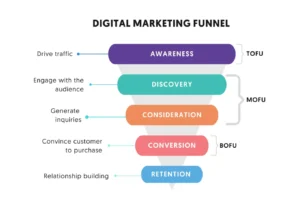
Image credit: reliablesoft
This is the first stage, where people are just becoming aware of your business. They might be facing a problem or have a need, but they don’t know yet that you have the solution. Your goal here is to get your brand in front of as many eyes as possible and make a good first impression.
How to do it:
At this stage, your audience isn’t ready to buy yet—they’re just learning who you are. Your goal is to provide value and catch their attention.

Now that potential customers are aware of your business, they start considering their options. This is where you build trust and show them why you're the best choice to solve their problem or fulfill their need. They might be comparing you to competitors or looking for more information.
How to do it:
This is also a good time to nurture your leads with email marketing campaigns, offering them more value and gently guiding them toward making a decision.
At this point, your leads are ready to make a decision. They’ve learned about your brand, compared their options, and now they’re on the verge of converting into paying customers. This is the most crucial part of the funnel, so your job here is to give them the final nudge.
How to do it:
Your goal here is to make the buying decision as easy as possible and eliminate any doubts they might have.

Congratulations! Your lead has now become a customer. But your job isn’t done yet—this is where the magic of turning a one-time buyer into a loyal customer comes into play. You’ve guided them through the funnel, and now it’s time to deliver a great experience and ensure they’re satisfied with their purchase.
How to do it:
By delivering an exceptional experience after the sale, you increase the chances of your customer returning and recommending your business to others.

Many businesses focus on getting new customers, but don’t forget about the ones you already have! Keeping your customers engaged and coming back for more is a key part of any successful digital marketing funnel. Plus, repeat customers are often more valuable and cheaper to retain than acquiring new ones.
How to do it:
Retention not only leads to more sales but also builds long-term loyalty and can even turn your customers into brand ambassadors.

These days, customers have more options than ever, and they don’t just stumble onto a purchase. They go through a journey—learning about their options, weighing pros and cons, and deciding who to trust. A digital marketing funnel helps you meet your potential customers where they are and gently guide them through each step of the buying process.
By creating a strong funnel, you’re not only increasing your chances of making a sale but also building lasting relationships with your audience. Whether you’re a small business or a growing brand, a well-structured digital marketing funnel is essential to turning visitors into leads and leads into loyal customers.
Our partners at Lucent Creative, a female-led digital marketing agency, help business owners like you set up marketing funnels that convert and boost revenue. Book a free consultation to get started!
Are you reaching your ideal client on social media? An increase in followers doesn’t always mean they’re engaged with your brand. Small businesses can’t ensure a captive audience when readers have an incredibly short attention span. Short of a “please silence your cell phones” message at the movie theater, your marketing team has to engage your audience through intentional content. (Hey, too bad we can’t pop some popcorn for you as you dig through this blog post.)
So, how do you make the most of your social media marketing efforts? We touched on the basics in 5 Ways to Get Strategic in Your Business Marketing, but today we’re going to touch on the importance of engaging your audience.

“I obviously know my audience.”, you say.
We trust you but hear us out.
We’re talking about the difference between knowing your audience and knowing what makes them tick, what their values are, and how you can build trust with them.
Let’s say you run a property management firm for income property owners.
Knowing you’re marketing to middle-aged people in the suburbs is a great start. Dig deeper and you realize that sure, your services are great for a middle-aged audience in the suburbs, but more specifically—those who have an average income of $150k, are close to retirement and want a done-for-them property management company for when they turn their home into a vacation rental and relocate.
Do you see the difference?
It pays to know your ideal client.
When you zero in on your target audience, you gain the ability to:
Pro tip: You may have a few ideal clients. Create a profile for each ideal client so you’re able to hone in on each specified audience in your marketing campaign.

Solidifying your target audience is half the battle. Now, it’s time to lead with customer service best practices. Engaging with your audience is vital for the success of your business. Even in a high-paced world, we all value quality time. We use the word “strategy” loosely here. The main idea is to create a culture of consistent engagement within your marketing strategy.
Here are some standout examples of excellent engagement across social media.
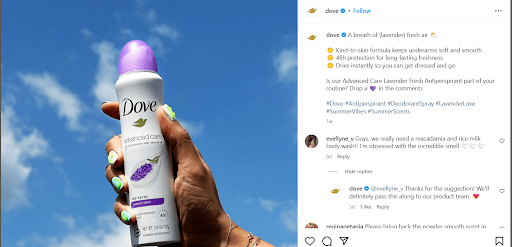
What’s to love?
Dove’s team commented on a suggestion for a new product scent. In less than 30 seconds, they validated their follower’s idea and said they’d pass it along. It’s an amazing example of hearing your out audiences and showing that they matter.

What’s to love?
A follower commented that the post didn’t specify the exact location and Visit San Diego took time to clarify. This simple point of engagement not only helped the commenter but anyone else that may have had the same question. Seems simple, right? Engaging with your audience clears up any misunderstandings.

What’s to love?
Kris replies to a comment saying the salad dressing recipe will be available in a few days. Engaging your audience creates opportunities to build anticipation for a future offer. Taking time to do this doesn’t just build trust with your followers, but gives them a reason to keep checking in.
Engagement with your audience is essential to building rapport with them, but how do you engage? Is it really as simple as replying to comments on social media? The short answer is yes!
We’ve put together some pro tips with our partners over at Lucent Creative.

We hope you’re learning from our social media series. Our partners at Lucent Creative are marketing gurus and we appreciate their help with all things marketing! If you haven’t already, go check out other posts in this series.
Do you know how to create a marketing plan that works for your business?
Marketing has been around for the long haul and though the means have changed, the goal is still the same—help potential customers see your service or product as the solution to their need.
There are endless resources that make marketing look easy and straightforward, but we’ve been in this game long enough to call out any “quick fixes” when it comes to marketing. We want to help you create a plan that works the first time. So, let’s cut through the marketing myths and get your team off on the right foot. We’re going to share the three most valuable assets of any marketing plan. Then, we’ll show you the tips and tricks to put it into action!

How does the adage go–“consistency is key”? New workout routine? You’ve heard workout instructors yell “Consistency is key!” at you through the screen. Changing habits? Consistency is key. It turns out the saying is a blanket truth for any lasting change you’re craving in your life. The same goes for your business. If you’re looking to improve ROI–consistency is key.
Consistency is important for your marketing plan because that’s how you get the data you’ll need to pivot your approach over time.
We recommend creating and sticking to a consistent marketing plan for three months minimum. Then, assess the data to see if your team is getting the desired outcome. Here are three quick tips to keep in mind as you’re building a marketing plan.
Let’s answer a few questions you may already be thinking through.
How do I know which social media platform is best for my business?
Begin by establishing your Ideal Customer. Once you know who is most attracted to and needs your service or product most, you’ll want to see which social media platforms your ideal customer uses. Take your offer directly to your ideal client or customer by showing up where they are. For example, a wealth management firm may know their ideal client are retirees. Research shows TikTok may not be the best social media platform to utilize for marketing efforts. In fact, the business may do best marketing on platforms like LinkedIn, or hosting local in-person events to promote their services.
Should I use new AI tools to write content for my marketing plan?
You can, but should you? We believe humans “write it best” when it comes to the desired tone and creating an authentic connection with readers. Our team has put together a whole blog post on AI here for further reading.
Are targeted ads worth the money?
Yes, we believe ads are 100% worth the money, but only if you’re targeting your ideal client. This is where you’ll want to flesh out your ICA (Ideal Customer Avatar). Know what they want, how old they are, their priorities, their income, and their overall values. When you target your ads, you’re increasing the chance of bringing in the customers/clients that will remain loyal to your brand.

Your marketing plan has to be in alignment with your business goals and unique needs. For example, your small yet mighty team doesn’t need to commit to a marketing plan that outnumbers your resources on hand. Successful marketing takes time, money, and—again, so much time! Therefore, time is your most valuable resource and it’s best to remain focused than to compare your marketing efforts to a Fortune 500 company. The best rule of thumb here is to go with consistency over perfection in the early stages.
Here are a few tips to keep your team focused.
What’s the goal of marketing? Should I aim for more followers before I focus on sales?
The truth is—followers don’t equate to sales. A business similar to yours may have 1.5 million followers on Instagram, but that doesn’t mean they’re getting engagement or sales from those followers. We recommend nurturing leads with authenticity. Build brand trust, show social proof that your product/service is helpful, and give followers valuable information they can use in their daily lives. Then, you’ll see a natural, organic progression to loyal customers.
How do I weave social proof into my marketing plan?
Find a way that is unique to your brand and will speak directly to your audience. For example, a cosmetics brand may provide social proof in video assets and see an impressive return because ideal customers can visualize the positive difference. Let the data show you which approaches work best for you and your audience.
Should I stick to marketing trends?
Nope. Trends come and go (very quickly!) in marketing. It doesn’t mean you shouldn’t experiment with trends, but it does mean you shouldn’t put all of your eggs in one basket. Marketing ebbs and flows. While your audience may be connecting more with a “trendy” competitor today, it doesn’t mean they will be tomorrow. Stick to what works. Again, keep an eye on your data regarding engagement!

While you shouldn’t get caught in comparison traps, we also don’t want you blindly throwing things to the marketing wall to see if it sticks. Continue to research algorithms, best practices, and lean into what your customers want from you. When in doubt, ask your ideal clients/customers for insight on how they want to keep in touch with your brand. Having direct feedback is the most valuable marketing asset you can have in your toolbox.
Should I use insights on every marketing platform?
Yes, we highly recommend budgeting for this. However, we also realize that data insights for a dozen platforms may not be feasible. In that case, watch the analytics on your primary marketing effort (i.e. email campaigns).
What if the analytics have plateaued?
If you’re not seeing any positive or negative changes in the data, it’s time to pivot. Create an addendum to your marketing plan to see the desired outcome. For example, your goal may be to get more people to sign up for your newsletter. Creating a new lead magnet as an opt-in for readers may be the most direct way to see new subscribers.

Your marketing plan doesn’t have to look any specific way. In fact, you’re at an advantage if you’re going against the flow. Create a marketing plan that is feasible, flexible, and also for your ideal client and not the masses. We’d love to chat with you about your business goals and how we may help create a plan that works for your business. Get in touch!
What does your current marketing strategy say about your business? Whether you’re new to the game and the ink just dried on your LLC papers or you’ve been around long enough to reinvent your business several times, marketing is crucial to your success. Let’s clarify—strategic marketing is essential for the success and longevity of your business. Marketing trends come and go, and sometimes they even come back to leave again. If you pay attention to marketing tips for any length of time, you’ll see they ebb and flow like the tide which can leave business owners like us feeling overwhelmed, right?
Thankfully, our business partners and rad friends over at Lucent Creative, an all-female digital marketing agency, help us to stay focused and on-point with our marketing efforts. Today, we’re sharing some nuggets of wisdom their team shared with us. Before we jump in, let’s review a few stats about marketing.
These marketing stats are just scraping the surface of why strategic marketing is essential to the life of your business. Marketing gives you a platform to share your product or service, but strategic marketing gives you a direct line with your ideal customer. See the difference?

Let’s get straight to the tips from our friends at Lucent Creative. Take these five action steps straight to your team today.
Do you feel that your marketing strategy is complex, but not accomplishing much? If you’re following marketing trends rather than your ideal customer, it’s time to reassess. For example, if your ideal customers are retirees looking for wealth management options, your TikTok strategy probably isn’t yielding great results.
Lucent Creative’s CEO and Founder Kendall Walker shared,
“I have been in marketing for years and have seen a lot of ambitious and well-intentioned businesses stall in their growth because they weren’t focused on their marketing efforts. Thankfully, there are always opportunities to stop, reassess, and pivot. My advice to businesses with any marketing budget is to study where their ideal customers are and put their marketing efforts exclusively into those platforms.”

Read all about creating an email campaign that rocks with Zoho Campaigns.
Customers purchase from brands they trust. Earning the trust of your ideal client or customer requires engagement. Ironically, this is a step that is either neglected entirely or not focused on enough in marketing strategies. We got some insight into engagement with Lucent Creative’s social media strategist.
“I encourage clients to engage with their followers daily. If someone comments on your post, it’s crucial to reply. It’s a marketing 'hack' that humanizes your brand and helps build trust. Engagement doesn’t take a lot of time. If you spend ten minutes a day engaging with your followers in the comments and stories, I bet you’ll see an influx in sales soon. You’ve given them a reason to go all-in with just a few minutes of approachability.”
You may know what to say about your product, but do you know how to reach your ideal audience? This is where brand voice (what you say) and brand tone (how you say it) come into play. A business selling life insurance plans wouldn’t have the same brand voice or tone as a hot sauce company. Technically, anything could happen, but we’d venture to say it just wouldn’t be strategic or best practice.
Lucent Creative’s copywriter gave us a few tips in this area.
“Establishing your brand voice and tone is the foundation of your marketing strategy. It all starts with being incredibly intentional about who you’re talking to and how they can benefit from your product. Explore your ideal customer’s needs, struggles, purchasing habits, and anticipated hesitations about buying your product. If you do this, you’re going to set your entire marketing team up for success.”

Marketing isn’t a “set it and forget it” aspect of business. It’s as important as your product development, sales, and employee retention. What is working today may need adjusting next quarter.
Kendall Walker shared another piece of wisdom with us about the need for pivoting often.
“Marketing strategies need to grow and change with your business. Algorithms change, of course, but so do your customers and their expectations. What works now may not work next year. Keep an eye on the data, customer feedback, and ultimately, the trajectory of your business. Think of your marketing strategy needing frequent “checkups”. Schedule these and get your team thinking creatively about how to make your great strategy even better.”

How’s your website working for you? Read Your Guide to Designing an Epic Website
Be mindful to recognize and thank your loyal customers. Your business can do this in a lot of ways, but starting with a simple loyalty program or exclusive offers is a great place to invest your time and money. 75% of consumers will favor a brand if there is a loyalty program. 71% of consumers who are members of loyalty programs say membership is a meaningful part of their relationships with brands.
To wrap up, we asked Kendall, her social strategist, and copywriter to share their insight on how businesses can best show appreciation for loyal customers. Here’s what they had to say.
“I can’t stress the importance of creating the image of being a thorough and approachable brand. People want to know they can ask questions, express concerns, and rely on you, the expert, to give them valuable insight.”
Kendall, Lucent Creative CEO and Founder
“I agree with Kendall. The way to create a multiple-level point of contact people actually want to take advantage of is through intentional copywriting. Show your brand personality and always put the customer first in all of your written content. People catch on immediately if they’re appreciated and if they can keep trusting your business/product.”
Lucent’s copywriter
“To go along with this theme, I think it’s important to remind businesses that their social media is their “storefront” and their “first date”. This is the first impression of your brand. This goes beyond social media, of course. Your website matters. Email marketing campaigns are also a first-row view into your brand. Be consistent and your customers will continue to trust you and purchase from you.”
Lucent’s social media strategist
We all know marketing is important, but these five tips are ways to go the extra mile for your customers. The main idea is to not become complacent in your marketing efforts. Keep an eye on the data and your customers’ needs.
If you’re looking to partner with Woggle and Lucent Creative for your marketing efforts, get in touch to book your free consultation call.
You’ve probably heard about the new AI guru taking the world by storm. ChatGPT has business owners wondering if they can minimize their marketing teams and copywriters if they keep their jobs.
OpenAI, the developers of ChatGPT, says this about their “Frankenstein’s Monster,” “We’ve trained a model called ChatGPT which interacts in a conversational way. The dialogue format makes it possible for ChatGPT to answer followup questions, admit its mistakes, challenge incorrect premises, and reject inappropriate requests.”
We’re impressed by the overall capability of ChatGPT (and a little unsettled?). It’s undoubtedly a fantastic tool to have on hand, but we started wondering if it could replace professional copywriters.

As a team who specializes in consultancy and marketing, we wanted to give ChatGPT a spin. Here’s what happened.
We got straight to the point. After all, ChatGPT is AI, and we didn’t take the time to discuss the weather or future summer vacation plans.
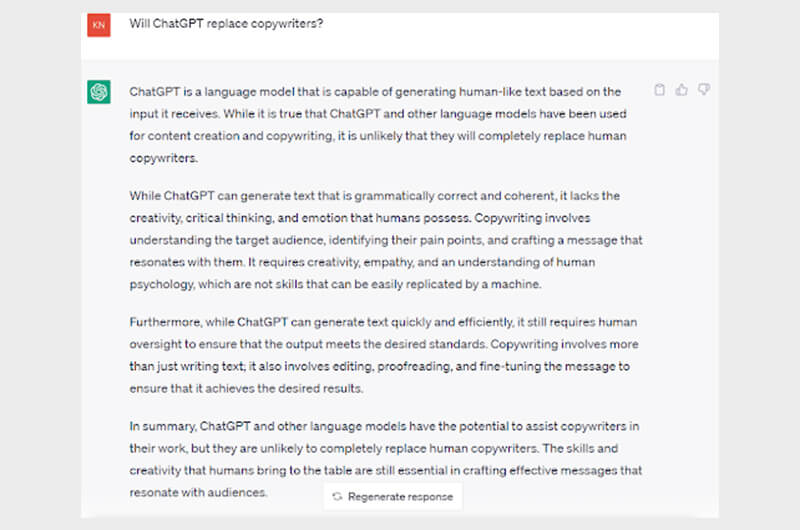
In a nutshell, the AI platform admitted that although it’s excellent, it doesn’t have the human capacity to complete a copywriting project from start to finish. We figured as much, but look at the details—copywriting is a multifaceted skill set. ChatGPT cannot:
Where does this leave marketing teams? We still weren’t sure. ChatGPT was an admitted non-writer, and we wanted to test the waters. Could AI present the same information in various tones of voice?
We chose a topic and asked our AI friend to give us general information on email campaigns. It didn’t disappoint.
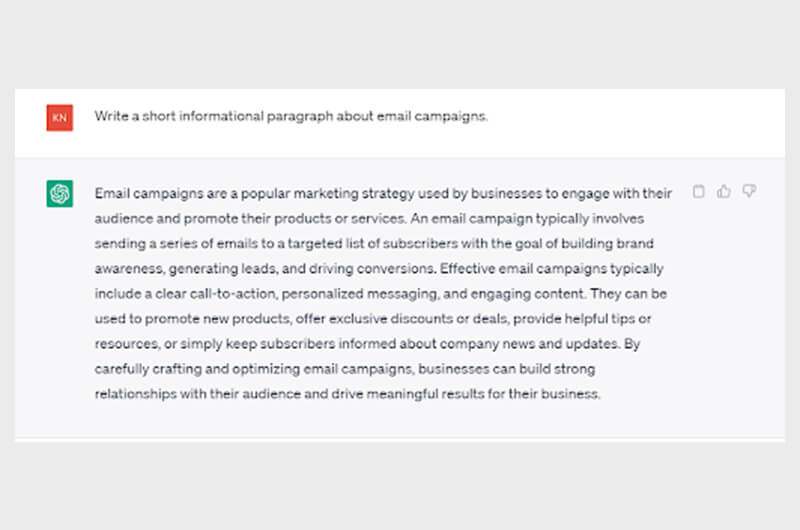
Here’s how ChatGPT delivered when given the task:
Although it checked the boxes, the copy is missing tone or any indication it’s being written for a specific audience. So, we took things a step further. We asked ChatGPT to give us copy that was more informal and approachable.
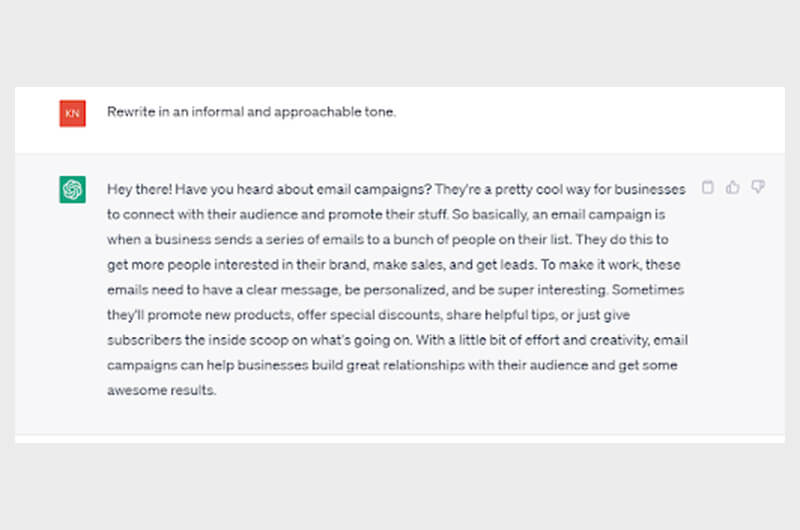
Now, we were getting somewhere. ChatGPT took our commands and created something sounding more human. Was this the proof we needed to ditch our copywriters? Not exactly.
Although ChatGPT considered our notes and had an unbeatable turnaround time, it didn’t create copy for a specific audience. For example, this may be too informal for some. ChatGPT delivered a conversational tone, but fine-tuning would be needed for most of our marketing clients.
We wanted to see how AI would present the same information with different instructions regarding tone. Unfortunately, we had a little too much fun here.
First, we asked ChatGPT to rewrite the information using extreme formality. It immediately went to the task and created copy that was fit for a medieval knight or inner circle of a 1600s royal court.
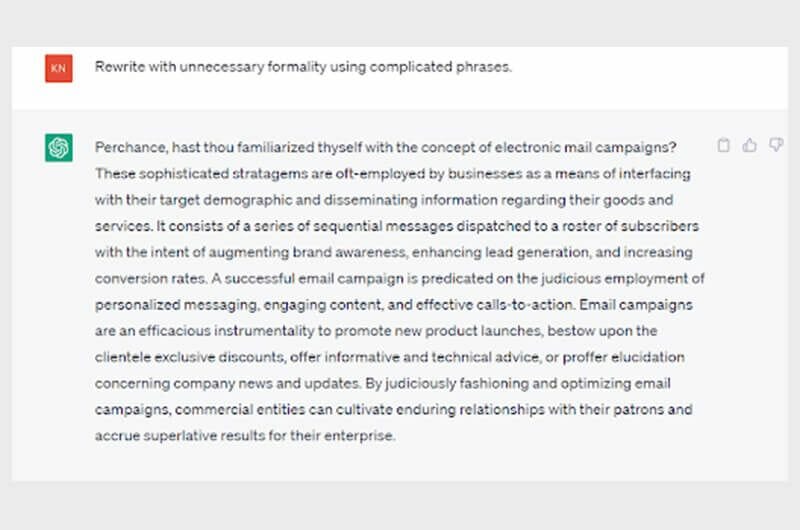
Then, we experimented on the other side of the spectrum. We asked the AI platform to explain email campaigns with sarcasm. After a good laugh, we called an end to our experimentation so our human writer could get to work on this blog post.
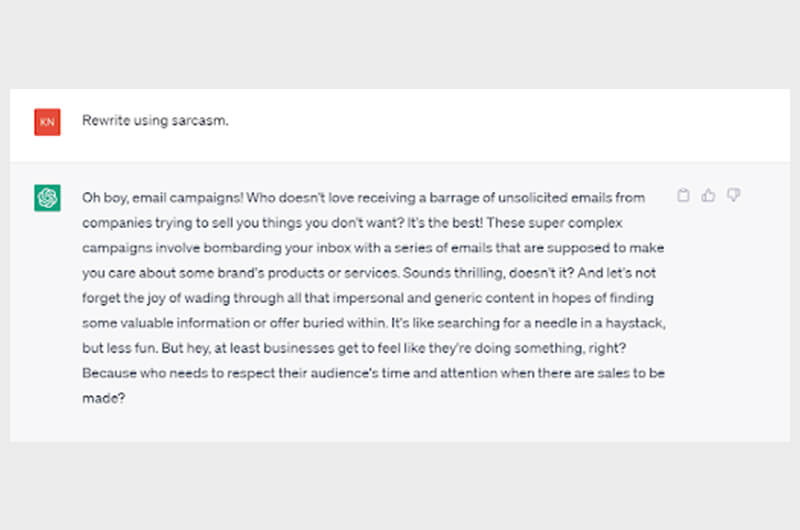
Our team agrees the AI platform is impressive. It’s a significant step in the right direction. The capabilities of ChatGPT will help businesses make strides in marketing.
We appreciate:
When it comes to using ChatGPT in marketing efforts, we’re still wary. In our opinion, the inability to cater copy directly to your ideal client doesn’t make the platform sustainable for all your written content needs. However, we see the value of using ChatGPT sparingly in short-form content such as social media posts or as an assistant in writing speeches or presentations.
The biggest cautionary tip is to use ChatGPT sparingly in your marketing. It’s not near a point of replacing human writers. The copy will still need editing to bring in the human tone to attract clients.
Here are a few tips for implementing ChatGPT into your marketing efforts:

ChatGPT is a considerable breakthrough in AI, and we love it. We had fun experimenting with the various tones and giving the platform instructions to prove the world still needs writers. However, even the best style implementation with ChatGPT doesn’t consider your client’s pain points. Contact our team if you’re looking for a group of humans to help with your copywriting and content writing. Our friends at Lucent Creative partner with us to give business owners like you personable written content that speaks directly to your ideal and converts them into loyal customers.
You may sit blankly staring out a window most days pondering, ‘If only there was a way to streamline my business operations and experience joy again.’ The reality is, your business doesn’t have to merely survive day-to-day. You can put systems in place that allow you to run your company more efficiently and finally feel like the boss you are (both literally and in the 80s lingo).

Enter Zoho, the one-stop shop for business automation goodness.
As official Zoho Partners, we are obviously huge fans of the platform and we see how its integrations improve business operations big and small.
We’ll also show no shame in admitting that Zoho is (beautifully) complex. It’s a platform that takes time to learn and ultimately, conquer.
Enter The Workflow Academy–where Zoho One begins to make a little more sense to the everyday user!
Afterall, every time a bell rings, a Zoho user becomes a Zoho Master (or something like that).
In a nutshell, The Workflow Academy is the superior spot for Zoho training. Whether you’re the team’s Zoho Admin or are all-in hanging out in the deep end of the platform, The Workflow Academy has a course with your name on it.
Have you been on the fence about getting Zoho for your business?
Here’s your sign to go for it!
Oh, and a helpful statistic to drive the benefits home–92% of employees say having technology that helps them do their job efficiently affects their work satisfaction, according to a study by Ultimate Software.
Now that you know you can have an amazing platform to help run your business and learn how to master, what is there to lose?
Go ahead and make your free Zoho One account here.
We’ll wait for you!
[cheesy elevator music]
Congrats! You’re officially in the game with Zoho One now.

Let’s continue to walk through the perks of TWA and get you enrolled in their free course.
At Woggle, we see clients that don’t realize the areas they’re losing valuable leads, revenue, or customer satisfaction until they start using Zoho and see the data roll in.
Spoiler alert: sometimes it’s areas they least expect or think they’re excelling in.
Not only does your business thrive when problem areas are identified and remedied; employees are able to focus on what they do best with a little help from their friend (automation).
So, what does The Workflow Academy help Zoho users perfect?
Here’s what we love about the courses over at The Workflow Academy:
✅Their online courses are free to Zoho users (yes, please!).
✅Learning is made easy to access across all devices.
✅There are so many courses to choose from! (Zoho One, Zoho Books, Zoho Projects, oh my!)
✅Empowering your staff to understand Zoho on a deeper advanced level
✅Get a better understanding of how Zoho works on the backend
✅Learn how to properly architect a solution that will work for your company
✅Diagnose needs and find a partner that will work well with you to create a customized solution
Pro Tip: Read our blog post on why hiring a Zoho consultant is the right move (objectively, of course).

As we mentioned, The Workflow Academy allows your business to pinpoint issues in your workflow that may be damaging customer satisfaction results. All businesses aren’t created equally and learning how to use Zoho will guide you to championing the unique nuances of each aspect of your business.
For example, your ideal client or customer may not need an extensive onboarding process, but setting it on autopilot can still save your company time (and time is money).
Still eager to learn more about how Zoho is an all-inclusive super machine for automation?
Read more about how Zoho SalesIQ’s Customer-First Approach Can Boost Your Business here.
We’ve mentioned (obsessively) how Zoho integrations can skyrocket revenue, customer satisfaction, and daily operations. The real beauty of Zoho is the compatibility it has with both B2B and B2C models.
The Workflow Academy equips your Zoho agency to know every small nuance of the platform as well as how to troubleshoot and personalize it for your unique business needs.
This means you become an expert on all things Zoho including:
The list goes on!
Zoho can feel like a complex beast, but really, it can be tamed! Investing in your knowledge of how your chosen CRM platform works is the best thing you can do for your business!
Read more about Zoho’s magical features like Zoho Surveys and Zoho Social in our other blog post.

The main gist?
Your business can run as efficiently as you’re willing to invest in automation.
The Workflow Academy takes you from out of the loop to expert. Don’t be the person who invests in a phenomenal tool, but doesn’t learn how to use it.
Eager to learn more about The Workflow Academy? Check them out here!
Jump in head-first by opening a free Zoho account.
Now that you’re convinced CRMs are more than worth it for your business, you’ve probably consulted the almighty Google and encountered your worst nightmare: options.
Okay, okay- options are good to have (most of the time). However, when deciding what’s worth paying for and what’s not worth the risk, multiple options can get a bit overwhelming.
Yummy options at the Thanksgiving table? Good. Many restaurant options when deciding where to go for dinner with your partner? Bad (very bad).
Lucky for you, we are here to make one choice a little easier! Recently we took a look at Zoho CRM vs Hubspot’s CRM, and today we are diving into Zoho vs Salesforce Sales Cloud. Who will come out on top? Let’s see!

Salesforce and Zoho have both created CRMs that help your business continuously grow and run smoothly. With that said, their focus over the years has been a little different. Zoho has placed more of an emphasis (and more of their budget) on research and development, while Salesforce focuses more on marketing and promotion.
Zoho has found it important to develop a CRM fit for small/medium businesses all the way to enterprise level. Salesforce has focused more on the enterprise level and gradually worked their way to more mid-market ventures.
While both approaches are absolutely fine, choosing between the two will depend on the size of your business and your goals!
In terms of user-friendliness and how much experience you would need to operate the platform, Zoho CRM seems to be easier. Not that Salesforce is difficult to utilize, but Zoho truly caters to users of all experience levels. We noticed that Salesforce would probably be optimal if operated by a dedicated team.
Both CRMs include a high level of customization capabilities (and you know we like that!) Salesforce’s Lightning App Builder seems to be top notch, allowing users to create custom layouts and records. A similar feature in Zoho would be Canvas. One customizable feature that is exclusive to Zoho CRM would be custom buttons, which is seemingly unavailable in Salesforce.
It’s worthwhile to note that with Salesforce, many of the customization features seem to only be available for higher packages. Customization for Zoho is much more accessible to all user levels.
Lead gathering and nurturing is a huge component behind CRM usage, so both Zoho and Salesforce have solid process building and lead scoring features. In an all out feature battle between Zoho and Salesforce, Zoho seems to have a more comprehensive set of lead tools in their toolbox. Salesforce’s lead tools seem to be more basic, but there’s certainly nothing wrong with perfecting the basics! Again, choosing between the two will largely depend on what you and your business are looking for.
One cool feature to mention? Sales representatives can scan a business card and Zoho CRM will easily convert the information into a contact! Zoho CRM can also create leads from social media platforms, which you cannot do with Salesforce unless you pay for the Social Studio plugin.
Although a little weaker with the social media integrations, Salesforce can generate solid leads by integrating with Outlook and Gmail, which is definitely a convenient tool.

It’s no mystery that Zoho has some excellent integration capabilities (we talk about it constantly)! Unfortunately, this is where Salesforce really fell short for us.
With Zoho CRM, you can seamlessly integrate with over 40 other Zoho products like Zoho Books, Zoho Desk, and Zoho Sign; Salesforce doesn’t have that perk.
One thing that really suffers from this lack of integration power? Team collaboration. Zoho CRM has Workplace, a convenient way to effectively communicate with coworkers and employees. Through apps like Cliq, Meeting, and Workdrive, you can share documents and updates with the click of a button. With Zoho CRM you can also incorporate third party applications like Microsoft Teams and Slack for ultimate team collaboration!
While Zoho users can integrate with third-party applications no matter the CRM edition, Salesforce only allows this in the top packages. You can’t utilize popular applications like ZenDesk, MailChimp or Quickbooks until you pay for the Professional or higher Salesforce Sales Cloud packages.
Ah, the inevitable price discussion. In a side by side comparison, Zoho is indeed cheaper than Salesforce Sales Cloud. Zoho also offers a free version of their CRM (with limited users), whereas Salesforce only has the free trial. Both offer a 30 day free trial.
Both pricing models are centered around standard (essentials), professional, enterprise, and ultimate packages. Each CRM bills you per user, offering monthly or annual subscriptions. So, again, depending on the size of your company and your ultimate goals, either could be the better fit- you’ll just have to decide which one is worth the investment!

So, as an epic entrepreneur, what is your CRM focus? Leads? Integrations? Customization? Don’t worry, we’ll quit asking you questions (eventually)!
Whether you are just starting out or you’re a well-established business, there’s a CRM out there for you. It’s all about finding the one that suits your needs the best! Even though it requires a little bit of research, we are confident one will be a perfect fit.
Let us know if you end up choosing Zoho CRM or Salesforce Sales Cloud- we’d love to hear your opinions on the topic!
Annnd we are back with yet another great episode of Zoho Books: Accounting Software Extraordinaire! Boy is this a series we could easily binge-watch… Ok, maybe Zoho Books and chill doesn’t seem all that appealing- we get that. Something that does seem appealing? Another great Zoho Books integration that makes the tax side of your small business seem like less of an obstacle: Avalara!
With this handy integration, Zoho Books not only has your accounting under control, but you’ll be able to rest easy knowing you are sales tax-compliant!
Growing your business takes a lot of time and energy; why not focus on what’s important while Zoho Books and Avalara take care of the nitty gritty money details? Makes perfect “cents” to us! (Don’t worry, that’s it for the puns for today.)
If the accounting world had high school superlatives, Zoho Books and Avalara would 100% win the cutest couple title. Now you may think that’s a bit extreme, but hear us out!
First of all, Zoho books allows you to automate all your business’ accounting needs for a very fair rate. Invoices, reports, inventory-tracking– Zoho Books has a feature that covers just about anything you can think of.
However, one thing we are missing from this accounting equation: the expansive and mysterious world of sales and use taxes. (Does reading the word ‘taxes’ make you cringe? Because it sure did make us cringe as we wrote that.)
That’s where Avalara fits in perfectly: they offer cloud-based software that can help just about any size business remain tax-compliant. Whether small, midsize, or enterprise– your business doesn’t have to continually battle the confusion and overwhelm that taxes can cause. Struggling with keeping track of all the new regulations? Confused about the categories your business falls under? Avalara is built for businesses with questions just like these!

Sick of manually entering everything and doing the math yourself? Does it make you nervous to count on free applications and websites to take care of such an important task? Avalara is a great way to automate your sales tax situation while you focus on everything else that’s important!
Plus, Avalara can truly be a ‘set it and forget it’ scenario, because they will add updates and automatically keep everything compliant no matter the random changes.
Do resources on taxes often create more questions, rather than answering the ones you came there for? Don’t worry, it happens to us all the time. (It may have even happened to us as we wrote this very blog post…)
So, we’ve accumulated a list of things that we wanted more clarity on, and that Avalara just so happens to take care of for you:
Did you know you have to register your business before collecting sales tax? Any state where you make sales, you have to register your business with that state. If it sounds like a hassle (and too much paperwork), that’s where Avalara steps in and not only simplifies the process, but makes sure you have registered in all the right states.
Does your state offer tax exemption holidays? Do you know who qualifies as exempt? Does your product/service qualify for exemption? If you’re like us and don’t have time to worry about details like this, Avalara knows all the answers to these questions and more.
Like we mentioned before, you won’t have to worry about any new laws or changes with Avalara around. They do all the research for you!
Location is important when it comes to sales and use taxes. Do you understand your jurisdiction? Are you charging the right amount of taxes for your jurisdiction? Turns out your jurisdiction is way more than a zip code! Avalara can determine all of this for you (or confirm you have been doing it correctly).
If you conduct a certain type or amount of business in a given state, you have possibly created a nexus in that state. This means you must collect sales taxes and pay them what you collect. Even better, every state has different rules (yes, we’re serious). Sounds like we’ll let Avalara handle that potential nexus chaos!
Does your business involve more than just straightforward retail? Are you unsure of how to proceed with sales taxes? Are you unsure if you even need to collect sales taxes? With things like short-term rentals, you may be missing some tax items, whereas you don’t have to worry about it under a marketplace facilitator like Etsy. Avalara will look at all these factors and determine what you need to consider!
If you run sales through your site and use an ecommerce solution like Shopify or Squarespace, you have to collect your own sales tax. Thankfully Avalara can seamlessly integrate with your ecommerce platform and make that way easier!

Avalara is just one giant confidence boost for business owners, and that’s something we can get behind! Put your mind at ease and walk away feeling:

Honestly, we keep thinking of more and more great things about the Zoho Books and Avalara duo, but we want to keep this short and sweet. Head on over and check out what options are a great fit for you and your business!
Brand integrity: phew, what a complex and layered topic! We don’t blame you if a million things come to mind when you hear the word “brand”-- the same thing happens to us!
When it comes to developing a brand, there’s certainly some information overload. What does it mean? What should be focused on first? What are the rules?
There’s no official handbook, but a kazillion blogs are trying to tell you the best approach. That’s why we aren’t here with a step-by-step how-to guide– we decided it would be much better to just let you know why brand integrity is so important.
After all, you won’t be motivated to do the best you can if you don’t understand why you are doing it!

Don’t worry, we aren’t giving you a boring textbook definition! In our opinion, brand integrity is something that happens when you stick with your values and authenticity– no matter the situation. It’s the basis of your reputation and the impression you leave initially (and going forward).
Brand integrity shows up through how you face adversity. It shows within your reaction when your business doesn’t live up to expectations or promises. No business is perfect, and there’s no way every single customer will be pleased. However, it’s how you handle these bumps in the road that maintain your brand integrity.
In developing brand integrity, a business hones in on the target audience and sticks with a consistent message. If you lose track of your brand integrity, you risk losing a customer (or two).
Let’s break down a few ways brand integrity impacts your business in the long run:
Even if customers are newly exposed to your brand, a lack of brand integrity will be obvious.
Brand integrity will show up through a mission-focused, value-based approach. You will be able to easily relate to customers new and old. With a solid brand, it will be clear that you have identified what problems you can solve and what pain points you can address.
Consistency is always going to be key. You won’t have to explain your brand or show your integrity– customers will easily be able to see it for themselves.
Brand integrity will make it a lot easier to differentiate yourself from others in your niche. It will naturally demonstrate your experience and what you’ve learned throughout your time in the business.
It won’t always be the perfect picture, but imperfections display the strength of your brand integrity and how well you overcome challenges.
Your unique story will also contribute to the strength of your brand integrity and seamlessly weave in and out of what your customers see. This will set you apart from other businesses that haven’t taken the time to establish a brand or emphasize their story. It will set you apart from those who don’t have a clear focus or consistently try to relate to their audience.
Clearly, customer acquisition is important, as companies spend tons of money each year on this very thing. However, retention is just as important. It’s a lot cheaper and easier to keep customers coming back versus only focusing on new ones!
Your product/service will accomplish the main goal (hopefully), but ultimately the brand integrity is what creates the relationship with your customers. This relationship is what keeps them coming back and recommending you to their friends and family. The relationship built through your brand integrity is what cultivates trust and expectations.
If you don’t focus on your brand and its integrity, you can lose out on many valuable relationships—which could lead to a loss of business!

We’ve talked about what it is and why it’s important, but let's discuss the basics behind brand integrity:
Authenticity- Be upfront and honest. Show that your business sticks to its values and the commitment to its customers. Show the ups and the downs in running a business. Let your audience see the full picture and truly relate. Make it obvious that you aren’t hiding anything behind a facade.
Confidence- Be transparent about limitations, but show confidence in your abilities and experience. Don’t hide adversities- put them on full display and show your audience how you handle issues. Persuade your audience that you know their pain points and are confident you can help.
Customer-centered approach- You have to show that your business looks at the big picture and fixes the entire problem. You're not just out there to present a quick fix and make some cash. Your focus is on the customer experience and the promises you have made.

We hope this leaves you with a better understanding of brand integrity and why it’s so important to the success of your business. It’s a different type of long-term investment that you might not have considered much before– an investment in your reputation and your customer relationships.
Spend the time and effort learning how to strengthen your brand integrity now and the outcomes will be more than worth it!
Want to find out how we can help you? Let’s chat.